Conflict Theories: Power, Domination, and Social Change
VerifiedAdded on 2023/01/19
|11
|2183
|52
Essay
AI Summary
This essay provides a detailed analysis of conflict theories as presented by Max Weber, Karl Marx, and C. Wright Mills. It begins by contrasting the conflict perspective with functionalist theory, highlighting the hierarchical nature of society and the marginalization of the less powerful. The essay then delves into each philosopher's conceptualization of conflict, power, and domination. Weber's theory emphasizes the role of the state in mediating conflicts within civil society. Marx's perspective focuses on class conflict arising from the exploitation inherent in private property and proposes a proletarian revolution as a solution. Mills examines the conflict between elites and masses, emphasizing the need for critical inquiry and an informed civil society. The essay concludes with an analysis of the similarities and differences in their approaches, emphasizing the importance of their contributions to understanding social change, oppression, and inequality.
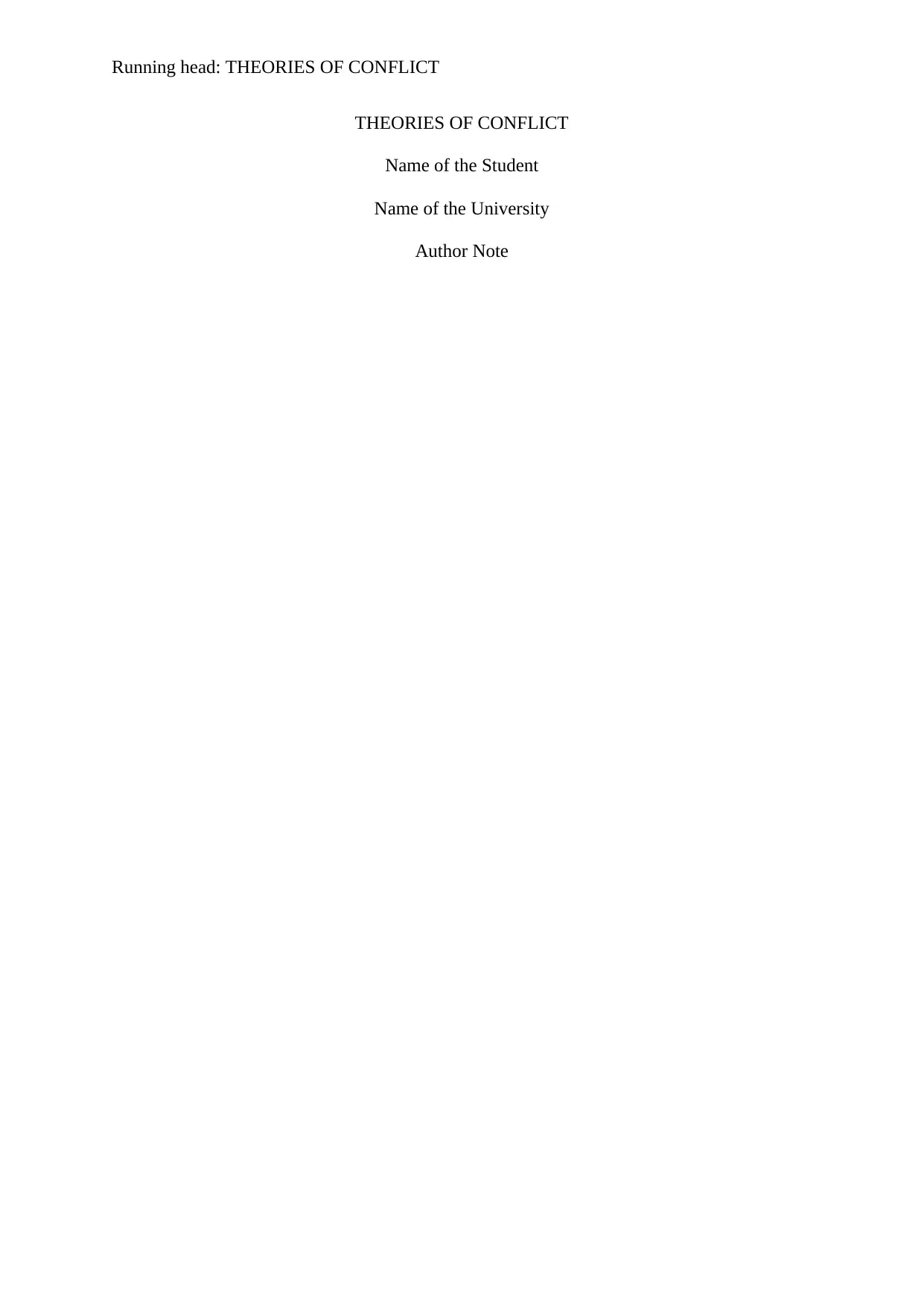
Running head: THEORIES OF CONFLICT
THEORIES OF CONFLICT
Name of the Student
Name of the University
Author Note
THEORIES OF CONFLICT
Name of the Student
Name of the University
Author Note
Paraphrase This Document
Need a fresh take? Get an instant paraphrase of this document with our AI Paraphraser
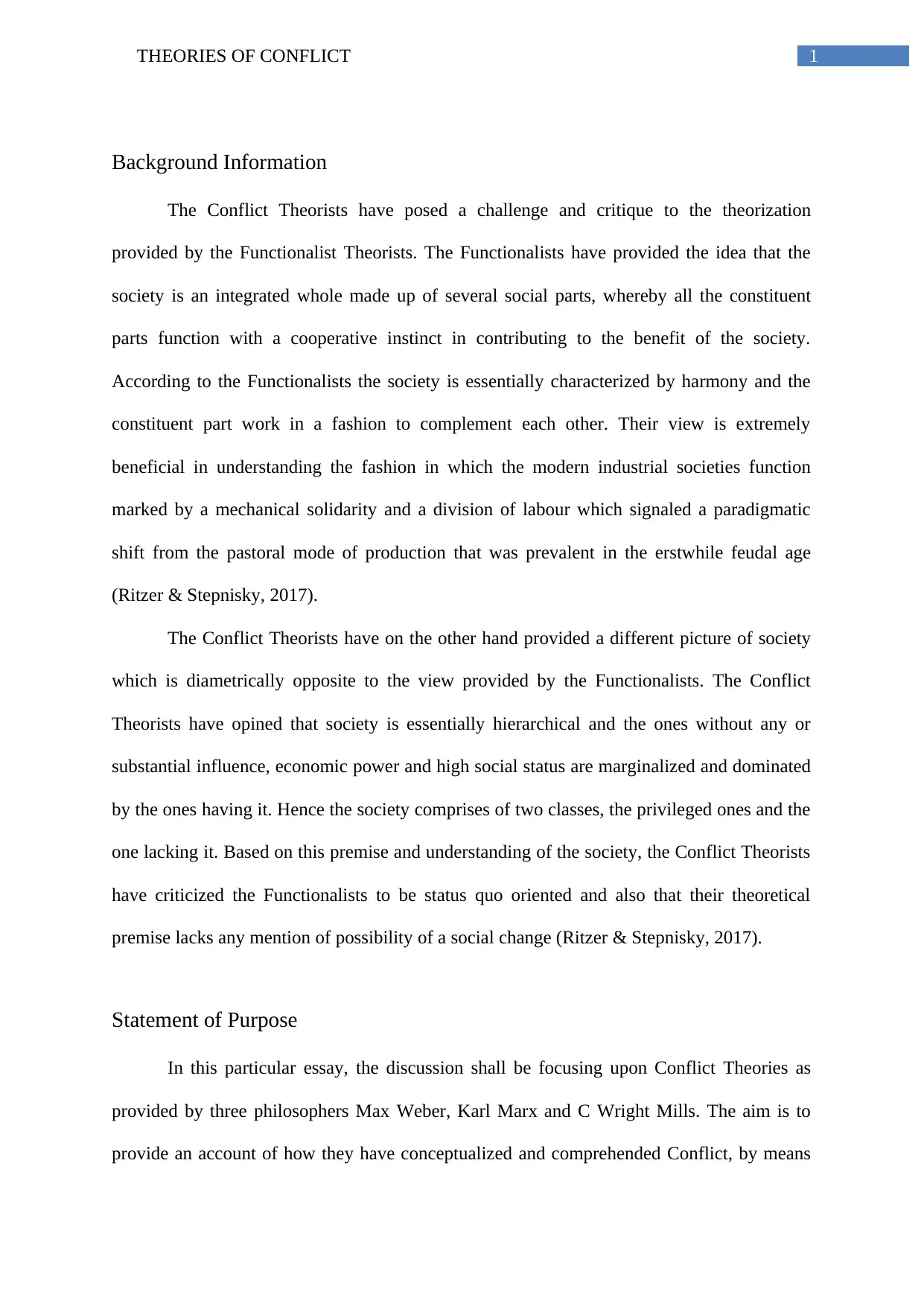
1THEORIES OF CONFLICT
Background Information
The Conflict Theorists have posed a challenge and critique to the theorization
provided by the Functionalist Theorists. The Functionalists have provided the idea that the
society is an integrated whole made up of several social parts, whereby all the constituent
parts function with a cooperative instinct in contributing to the benefit of the society.
According to the Functionalists the society is essentially characterized by harmony and the
constituent part work in a fashion to complement each other. Their view is extremely
beneficial in understanding the fashion in which the modern industrial societies function
marked by a mechanical solidarity and a division of labour which signaled a paradigmatic
shift from the pastoral mode of production that was prevalent in the erstwhile feudal age
(Ritzer & Stepnisky, 2017).
The Conflict Theorists have on the other hand provided a different picture of society
which is diametrically opposite to the view provided by the Functionalists. The Conflict
Theorists have opined that society is essentially hierarchical and the ones without any or
substantial influence, economic power and high social status are marginalized and dominated
by the ones having it. Hence the society comprises of two classes, the privileged ones and the
one lacking it. Based on this premise and understanding of the society, the Conflict Theorists
have criticized the Functionalists to be status quo oriented and also that their theoretical
premise lacks any mention of possibility of a social change (Ritzer & Stepnisky, 2017).
Statement of Purpose
In this particular essay, the discussion shall be focusing upon Conflict Theories as
provided by three philosophers Max Weber, Karl Marx and C Wright Mills. The aim is to
provide an account of how they have conceptualized and comprehended Conflict, by means
Background Information
The Conflict Theorists have posed a challenge and critique to the theorization
provided by the Functionalist Theorists. The Functionalists have provided the idea that the
society is an integrated whole made up of several social parts, whereby all the constituent
parts function with a cooperative instinct in contributing to the benefit of the society.
According to the Functionalists the society is essentially characterized by harmony and the
constituent part work in a fashion to complement each other. Their view is extremely
beneficial in understanding the fashion in which the modern industrial societies function
marked by a mechanical solidarity and a division of labour which signaled a paradigmatic
shift from the pastoral mode of production that was prevalent in the erstwhile feudal age
(Ritzer & Stepnisky, 2017).
The Conflict Theorists have on the other hand provided a different picture of society
which is diametrically opposite to the view provided by the Functionalists. The Conflict
Theorists have opined that society is essentially hierarchical and the ones without any or
substantial influence, economic power and high social status are marginalized and dominated
by the ones having it. Hence the society comprises of two classes, the privileged ones and the
one lacking it. Based on this premise and understanding of the society, the Conflict Theorists
have criticized the Functionalists to be status quo oriented and also that their theoretical
premise lacks any mention of possibility of a social change (Ritzer & Stepnisky, 2017).
Statement of Purpose
In this particular essay, the discussion shall be focusing upon Conflict Theories as
provided by three philosophers Max Weber, Karl Marx and C Wright Mills. The aim is to
provide an account of how they have conceptualized and comprehended Conflict, by means
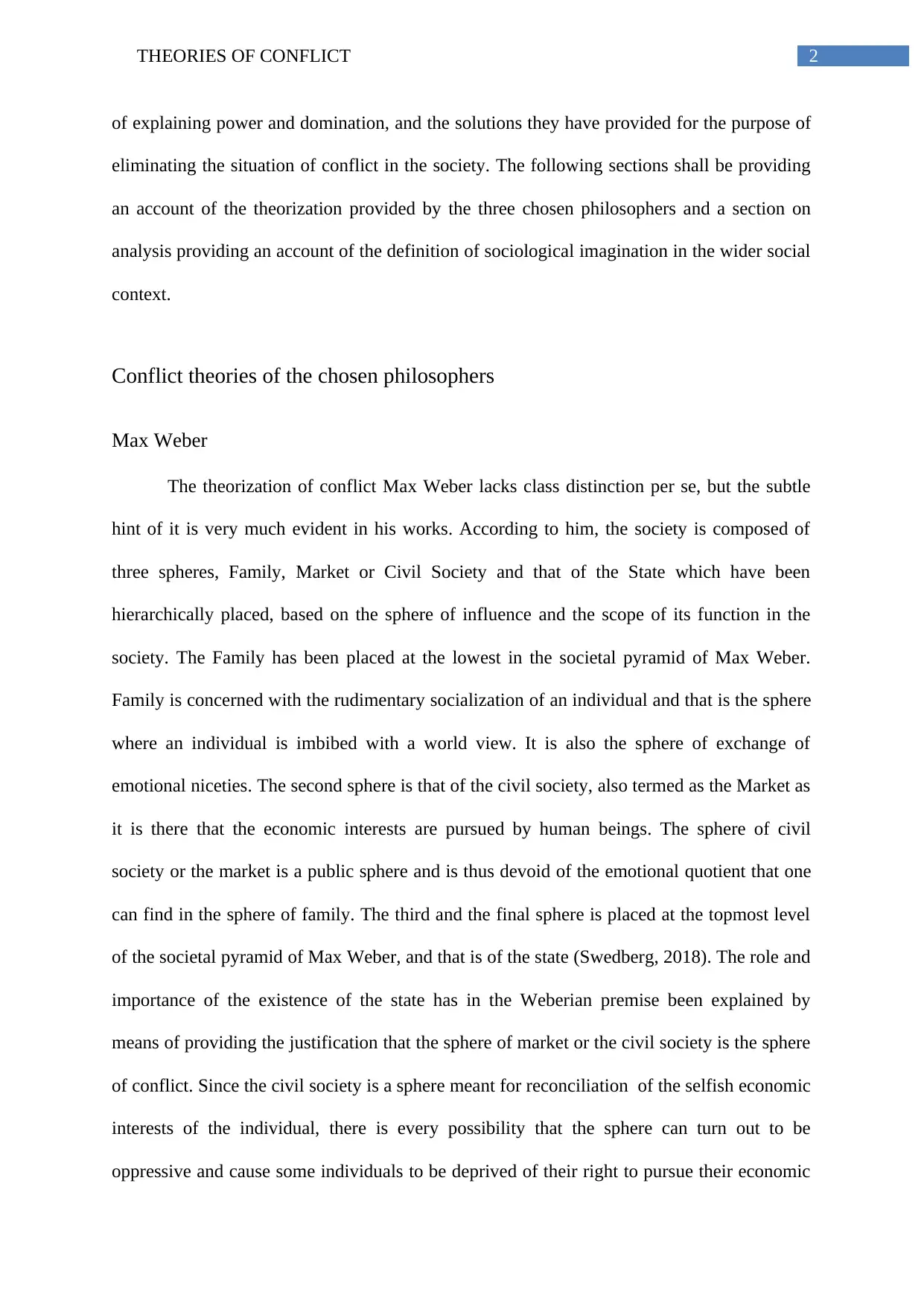
2THEORIES OF CONFLICT
of explaining power and domination, and the solutions they have provided for the purpose of
eliminating the situation of conflict in the society. The following sections shall be providing
an account of the theorization provided by the three chosen philosophers and a section on
analysis providing an account of the definition of sociological imagination in the wider social
context.
Conflict theories of the chosen philosophers
Max Weber
The theorization of conflict Max Weber lacks class distinction per se, but the subtle
hint of it is very much evident in his works. According to him, the society is composed of
three spheres, Family, Market or Civil Society and that of the State which have been
hierarchically placed, based on the sphere of influence and the scope of its function in the
society. The Family has been placed at the lowest in the societal pyramid of Max Weber.
Family is concerned with the rudimentary socialization of an individual and that is the sphere
where an individual is imbibed with a world view. It is also the sphere of exchange of
emotional niceties. The second sphere is that of the civil society, also termed as the Market as
it is there that the economic interests are pursued by human beings. The sphere of civil
society or the market is a public sphere and is thus devoid of the emotional quotient that one
can find in the sphere of family. The third and the final sphere is placed at the topmost level
of the societal pyramid of Max Weber, and that is of the state (Swedberg, 2018). The role and
importance of the existence of the state has in the Weberian premise been explained by
means of providing the justification that the sphere of market or the civil society is the sphere
of conflict. Since the civil society is a sphere meant for reconciliation of the selfish economic
interests of the individual, there is every possibility that the sphere can turn out to be
oppressive and cause some individuals to be deprived of their right to pursue their economic
of explaining power and domination, and the solutions they have provided for the purpose of
eliminating the situation of conflict in the society. The following sections shall be providing
an account of the theorization provided by the three chosen philosophers and a section on
analysis providing an account of the definition of sociological imagination in the wider social
context.
Conflict theories of the chosen philosophers
Max Weber
The theorization of conflict Max Weber lacks class distinction per se, but the subtle
hint of it is very much evident in his works. According to him, the society is composed of
three spheres, Family, Market or Civil Society and that of the State which have been
hierarchically placed, based on the sphere of influence and the scope of its function in the
society. The Family has been placed at the lowest in the societal pyramid of Max Weber.
Family is concerned with the rudimentary socialization of an individual and that is the sphere
where an individual is imbibed with a world view. It is also the sphere of exchange of
emotional niceties. The second sphere is that of the civil society, also termed as the Market as
it is there that the economic interests are pursued by human beings. The sphere of civil
society or the market is a public sphere and is thus devoid of the emotional quotient that one
can find in the sphere of family. The third and the final sphere is placed at the topmost level
of the societal pyramid of Max Weber, and that is of the state (Swedberg, 2018). The role and
importance of the existence of the state has in the Weberian premise been explained by
means of providing the justification that the sphere of market or the civil society is the sphere
of conflict. Since the civil society is a sphere meant for reconciliation of the selfish economic
interests of the individual, there is every possibility that the sphere can turn out to be
oppressive and cause some individuals to be deprived of their right to pursue their economic
⊘ This is a preview!⊘
Do you want full access?
Subscribe today to unlock all pages.

Trusted by 1+ million students worldwide
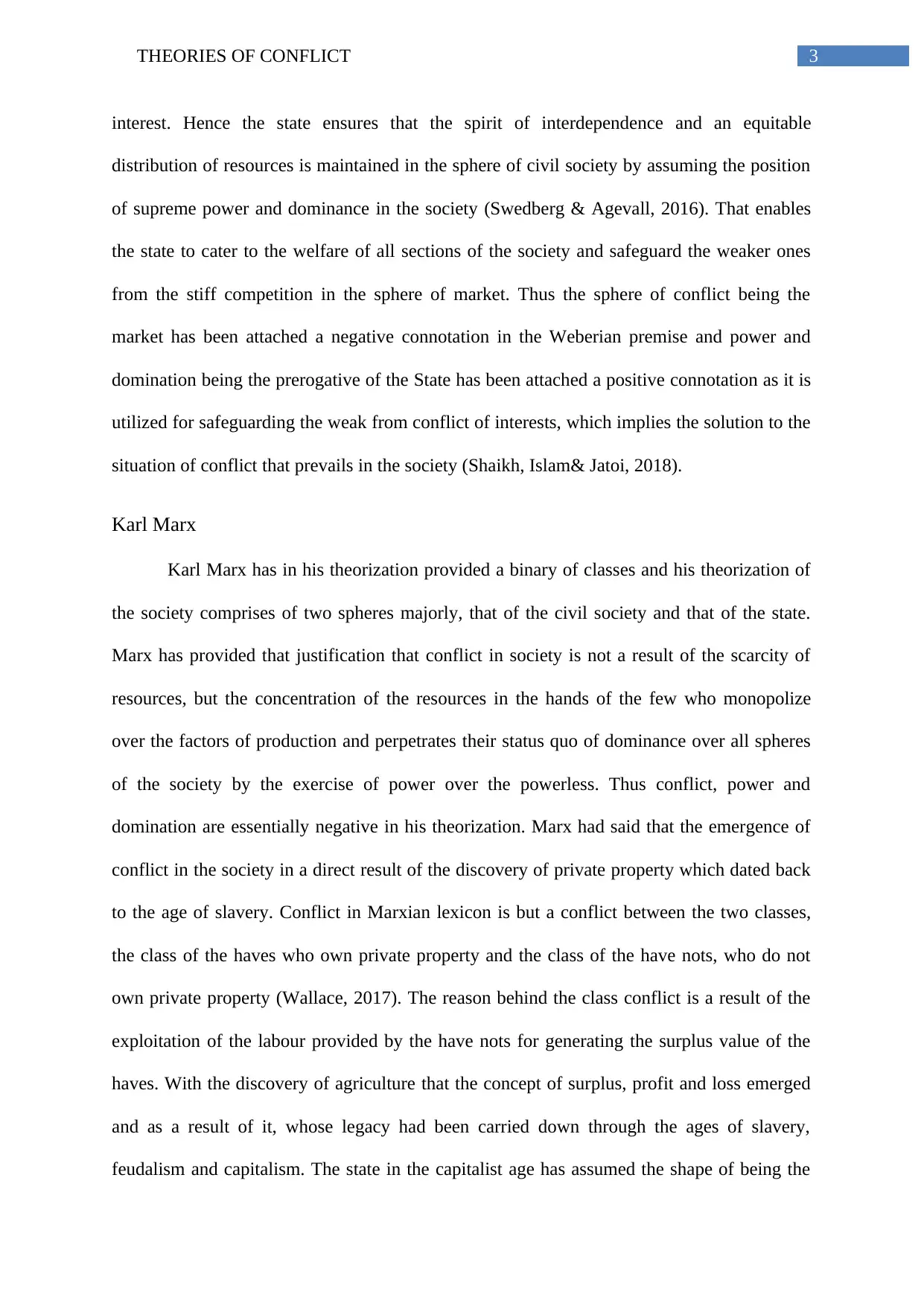
3THEORIES OF CONFLICT
interest. Hence the state ensures that the spirit of interdependence and an equitable
distribution of resources is maintained in the sphere of civil society by assuming the position
of supreme power and dominance in the society (Swedberg & Agevall, 2016). That enables
the state to cater to the welfare of all sections of the society and safeguard the weaker ones
from the stiff competition in the sphere of market. Thus the sphere of conflict being the
market has been attached a negative connotation in the Weberian premise and power and
domination being the prerogative of the State has been attached a positive connotation as it is
utilized for safeguarding the weak from conflict of interests, which implies the solution to the
situation of conflict that prevails in the society (Shaikh, Islam& Jatoi, 2018).
Karl Marx
Karl Marx has in his theorization provided a binary of classes and his theorization of
the society comprises of two spheres majorly, that of the civil society and that of the state.
Marx has provided that justification that conflict in society is not a result of the scarcity of
resources, but the concentration of the resources in the hands of the few who monopolize
over the factors of production and perpetrates their status quo of dominance over all spheres
of the society by the exercise of power over the powerless. Thus conflict, power and
domination are essentially negative in his theorization. Marx had said that the emergence of
conflict in the society in a direct result of the discovery of private property which dated back
to the age of slavery. Conflict in Marxian lexicon is but a conflict between the two classes,
the class of the haves who own private property and the class of the have nots, who do not
own private property (Wallace, 2017). The reason behind the class conflict is a result of the
exploitation of the labour provided by the have nots for generating the surplus value of the
haves. With the discovery of agriculture that the concept of surplus, profit and loss emerged
and as a result of it, whose legacy had been carried down through the ages of slavery,
feudalism and capitalism. The state in the capitalist age has assumed the shape of being the
interest. Hence the state ensures that the spirit of interdependence and an equitable
distribution of resources is maintained in the sphere of civil society by assuming the position
of supreme power and dominance in the society (Swedberg & Agevall, 2016). That enables
the state to cater to the welfare of all sections of the society and safeguard the weaker ones
from the stiff competition in the sphere of market. Thus the sphere of conflict being the
market has been attached a negative connotation in the Weberian premise and power and
domination being the prerogative of the State has been attached a positive connotation as it is
utilized for safeguarding the weak from conflict of interests, which implies the solution to the
situation of conflict that prevails in the society (Shaikh, Islam& Jatoi, 2018).
Karl Marx
Karl Marx has in his theorization provided a binary of classes and his theorization of
the society comprises of two spheres majorly, that of the civil society and that of the state.
Marx has provided that justification that conflict in society is not a result of the scarcity of
resources, but the concentration of the resources in the hands of the few who monopolize
over the factors of production and perpetrates their status quo of dominance over all spheres
of the society by the exercise of power over the powerless. Thus conflict, power and
domination are essentially negative in his theorization. Marx had said that the emergence of
conflict in the society in a direct result of the discovery of private property which dated back
to the age of slavery. Conflict in Marxian lexicon is but a conflict between the two classes,
the class of the haves who own private property and the class of the have nots, who do not
own private property (Wallace, 2017). The reason behind the class conflict is a result of the
exploitation of the labour provided by the have nots for generating the surplus value of the
haves. With the discovery of agriculture that the concept of surplus, profit and loss emerged
and as a result of it, whose legacy had been carried down through the ages of slavery,
feudalism and capitalism. The state in the capitalist age has assumed the shape of being the
Paraphrase This Document
Need a fresh take? Get an instant paraphrase of this document with our AI Paraphraser
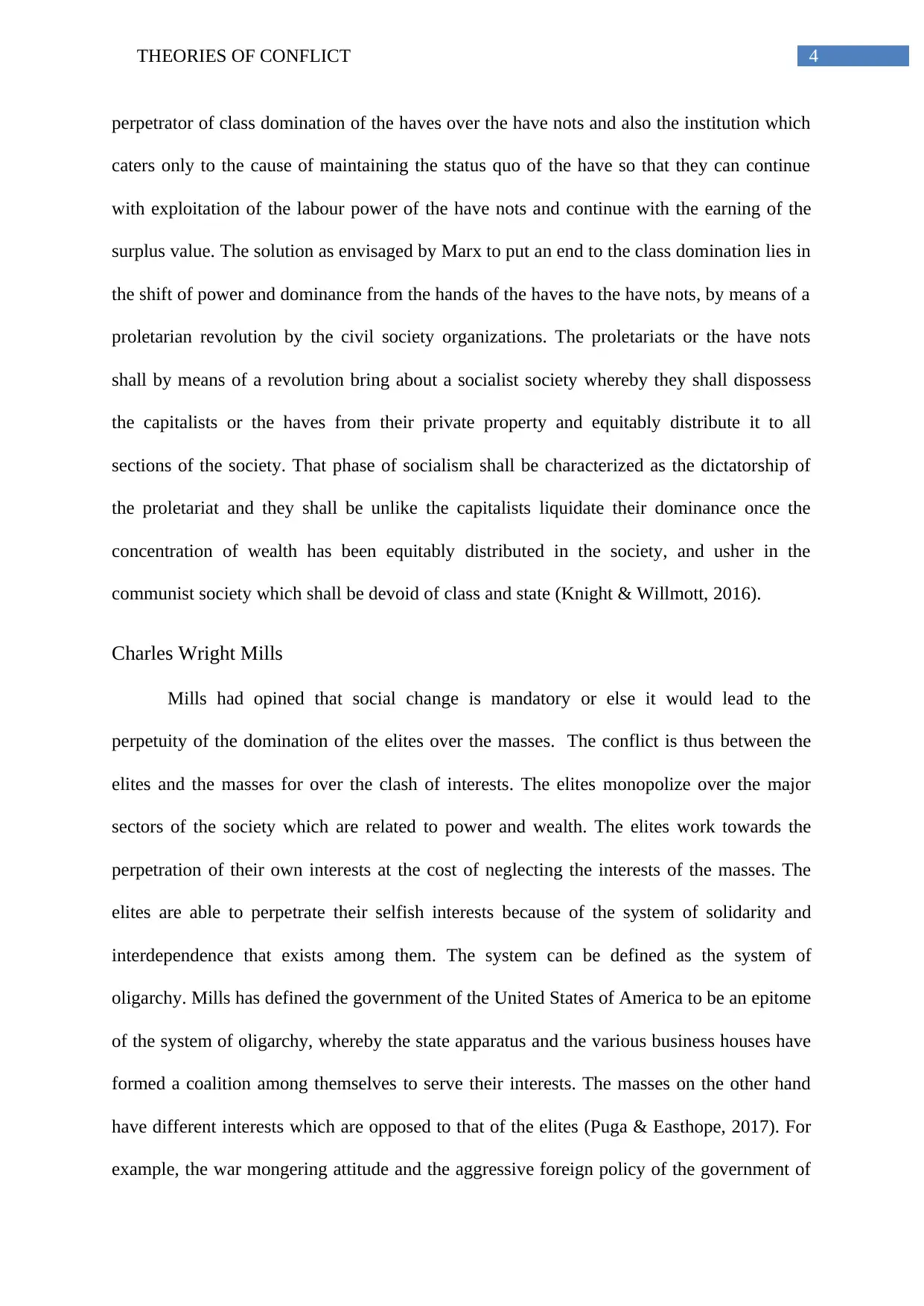
4THEORIES OF CONFLICT
perpetrator of class domination of the haves over the have nots and also the institution which
caters only to the cause of maintaining the status quo of the have so that they can continue
with exploitation of the labour power of the have nots and continue with the earning of the
surplus value. The solution as envisaged by Marx to put an end to the class domination lies in
the shift of power and dominance from the hands of the haves to the have nots, by means of a
proletarian revolution by the civil society organizations. The proletariats or the have nots
shall by means of a revolution bring about a socialist society whereby they shall dispossess
the capitalists or the haves from their private property and equitably distribute it to all
sections of the society. That phase of socialism shall be characterized as the dictatorship of
the proletariat and they shall be unlike the capitalists liquidate their dominance once the
concentration of wealth has been equitably distributed in the society, and usher in the
communist society which shall be devoid of class and state (Knight & Willmott, 2016).
Charles Wright Mills
Mills had opined that social change is mandatory or else it would lead to the
perpetuity of the domination of the elites over the masses. The conflict is thus between the
elites and the masses for over the clash of interests. The elites monopolize over the major
sectors of the society which are related to power and wealth. The elites work towards the
perpetration of their own interests at the cost of neglecting the interests of the masses. The
elites are able to perpetrate their selfish interests because of the system of solidarity and
interdependence that exists among them. The system can be defined as the system of
oligarchy. Mills has defined the government of the United States of America to be an epitome
of the system of oligarchy, whereby the state apparatus and the various business houses have
formed a coalition among themselves to serve their interests. The masses on the other hand
have different interests which are opposed to that of the elites (Puga & Easthope, 2017). For
example, the war mongering attitude and the aggressive foreign policy of the government of
perpetrator of class domination of the haves over the have nots and also the institution which
caters only to the cause of maintaining the status quo of the have so that they can continue
with exploitation of the labour power of the have nots and continue with the earning of the
surplus value. The solution as envisaged by Marx to put an end to the class domination lies in
the shift of power and dominance from the hands of the haves to the have nots, by means of a
proletarian revolution by the civil society organizations. The proletariats or the have nots
shall by means of a revolution bring about a socialist society whereby they shall dispossess
the capitalists or the haves from their private property and equitably distribute it to all
sections of the society. That phase of socialism shall be characterized as the dictatorship of
the proletariat and they shall be unlike the capitalists liquidate their dominance once the
concentration of wealth has been equitably distributed in the society, and usher in the
communist society which shall be devoid of class and state (Knight & Willmott, 2016).
Charles Wright Mills
Mills had opined that social change is mandatory or else it would lead to the
perpetuity of the domination of the elites over the masses. The conflict is thus between the
elites and the masses for over the clash of interests. The elites monopolize over the major
sectors of the society which are related to power and wealth. The elites work towards the
perpetration of their own interests at the cost of neglecting the interests of the masses. The
elites are able to perpetrate their selfish interests because of the system of solidarity and
interdependence that exists among them. The system can be defined as the system of
oligarchy. Mills has defined the government of the United States of America to be an epitome
of the system of oligarchy, whereby the state apparatus and the various business houses have
formed a coalition among themselves to serve their interests. The masses on the other hand
have different interests which are opposed to that of the elites (Puga & Easthope, 2017). For
example, the war mongering attitude and the aggressive foreign policy of the government of
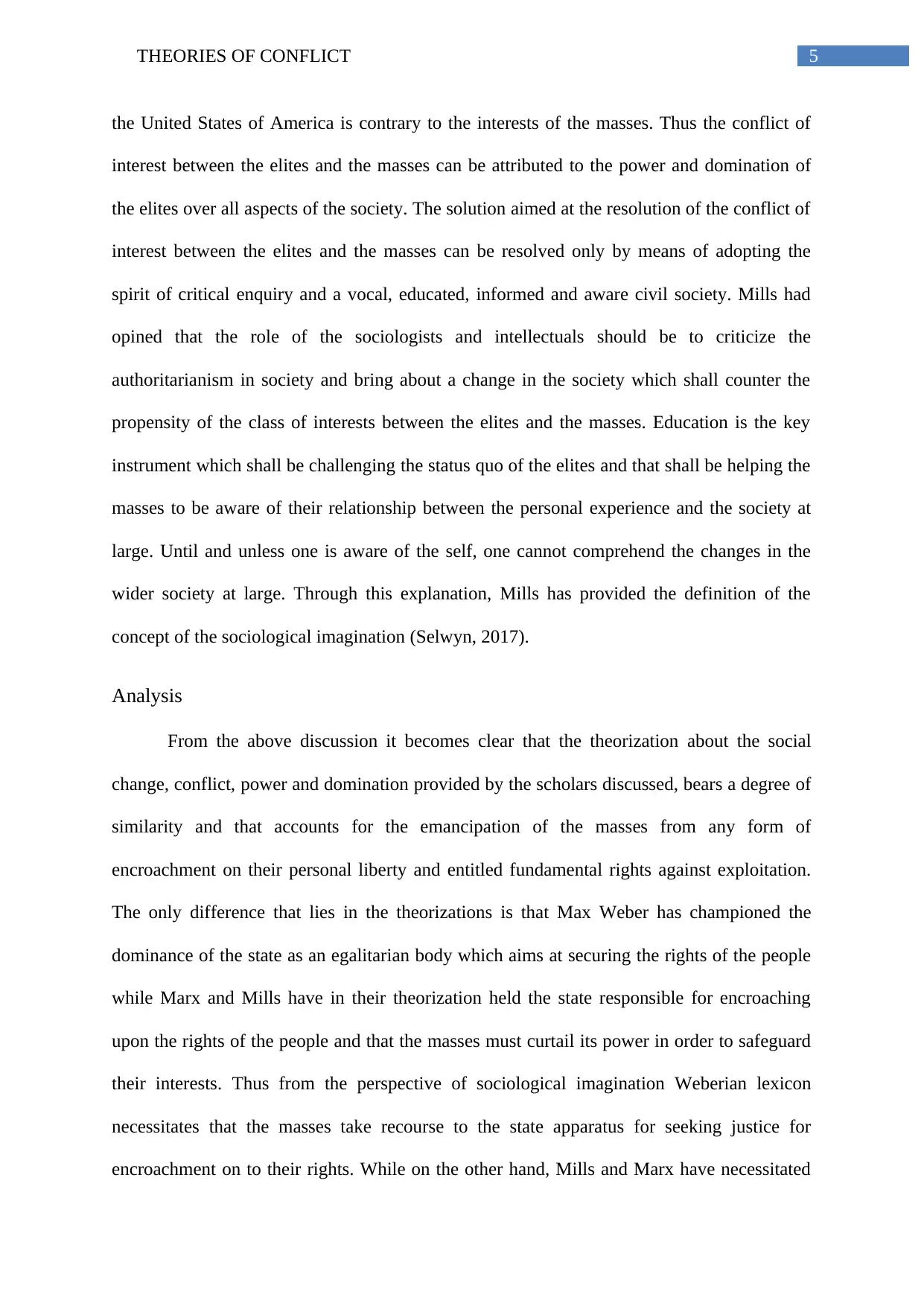
5THEORIES OF CONFLICT
the United States of America is contrary to the interests of the masses. Thus the conflict of
interest between the elites and the masses can be attributed to the power and domination of
the elites over all aspects of the society. The solution aimed at the resolution of the conflict of
interest between the elites and the masses can be resolved only by means of adopting the
spirit of critical enquiry and a vocal, educated, informed and aware civil society. Mills had
opined that the role of the sociologists and intellectuals should be to criticize the
authoritarianism in society and bring about a change in the society which shall counter the
propensity of the class of interests between the elites and the masses. Education is the key
instrument which shall be challenging the status quo of the elites and that shall be helping the
masses to be aware of their relationship between the personal experience and the society at
large. Until and unless one is aware of the self, one cannot comprehend the changes in the
wider society at large. Through this explanation, Mills has provided the definition of the
concept of the sociological imagination (Selwyn, 2017).
Analysis
From the above discussion it becomes clear that the theorization about the social
change, conflict, power and domination provided by the scholars discussed, bears a degree of
similarity and that accounts for the emancipation of the masses from any form of
encroachment on their personal liberty and entitled fundamental rights against exploitation.
The only difference that lies in the theorizations is that Max Weber has championed the
dominance of the state as an egalitarian body which aims at securing the rights of the people
while Marx and Mills have in their theorization held the state responsible for encroaching
upon the rights of the people and that the masses must curtail its power in order to safeguard
their interests. Thus from the perspective of sociological imagination Weberian lexicon
necessitates that the masses take recourse to the state apparatus for seeking justice for
encroachment on to their rights. While on the other hand, Mills and Marx have necessitated
the United States of America is contrary to the interests of the masses. Thus the conflict of
interest between the elites and the masses can be attributed to the power and domination of
the elites over all aspects of the society. The solution aimed at the resolution of the conflict of
interest between the elites and the masses can be resolved only by means of adopting the
spirit of critical enquiry and a vocal, educated, informed and aware civil society. Mills had
opined that the role of the sociologists and intellectuals should be to criticize the
authoritarianism in society and bring about a change in the society which shall counter the
propensity of the class of interests between the elites and the masses. Education is the key
instrument which shall be challenging the status quo of the elites and that shall be helping the
masses to be aware of their relationship between the personal experience and the society at
large. Until and unless one is aware of the self, one cannot comprehend the changes in the
wider society at large. Through this explanation, Mills has provided the definition of the
concept of the sociological imagination (Selwyn, 2017).
Analysis
From the above discussion it becomes clear that the theorization about the social
change, conflict, power and domination provided by the scholars discussed, bears a degree of
similarity and that accounts for the emancipation of the masses from any form of
encroachment on their personal liberty and entitled fundamental rights against exploitation.
The only difference that lies in the theorizations is that Max Weber has championed the
dominance of the state as an egalitarian body which aims at securing the rights of the people
while Marx and Mills have in their theorization held the state responsible for encroaching
upon the rights of the people and that the masses must curtail its power in order to safeguard
their interests. Thus from the perspective of sociological imagination Weberian lexicon
necessitates that the masses take recourse to the state apparatus for seeking justice for
encroachment on to their rights. While on the other hand, Mills and Marx have necessitated
⊘ This is a preview!⊘
Do you want full access?
Subscribe today to unlock all pages.

Trusted by 1+ million students worldwide
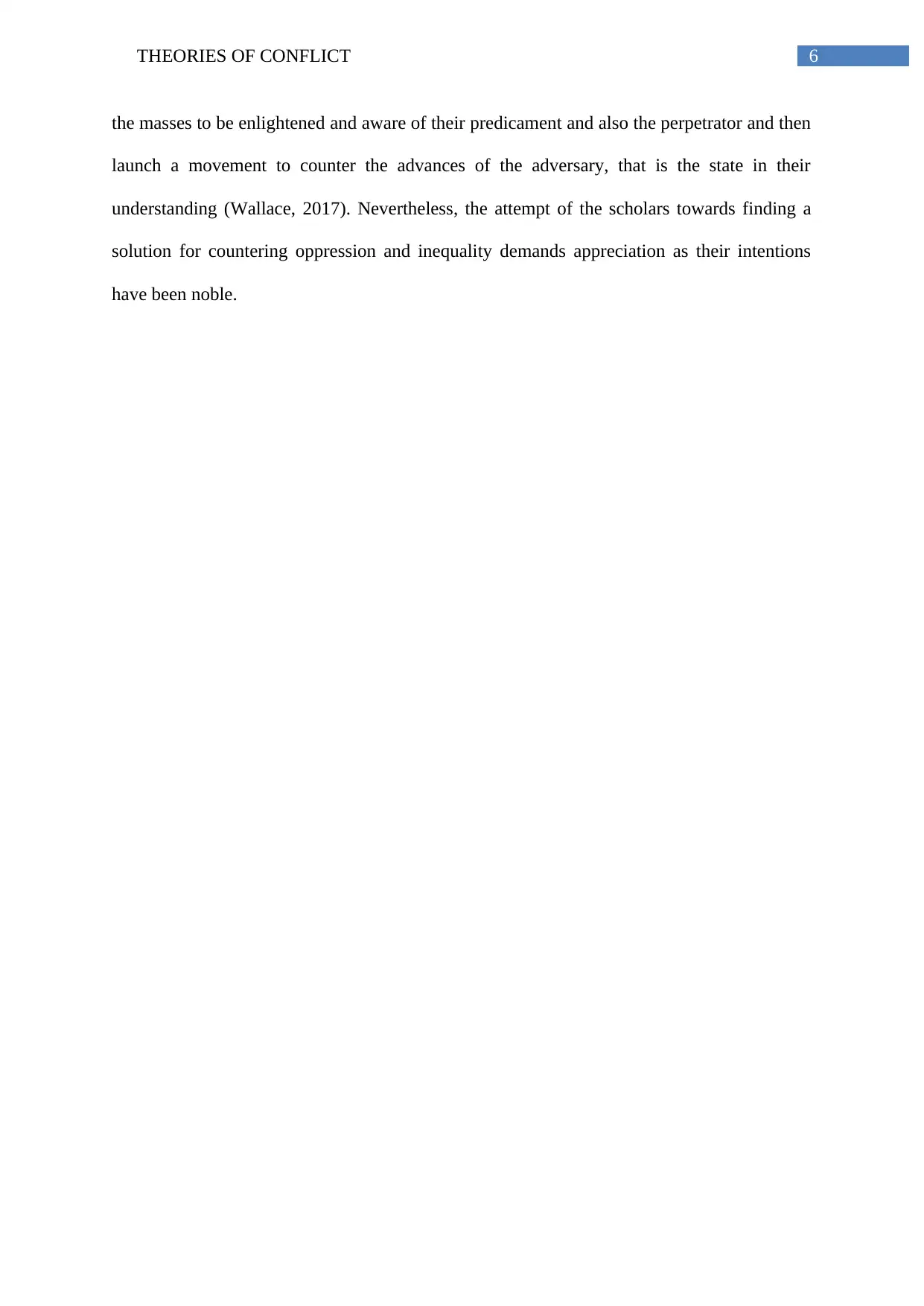
6THEORIES OF CONFLICT
the masses to be enlightened and aware of their predicament and also the perpetrator and then
launch a movement to counter the advances of the adversary, that is the state in their
understanding (Wallace, 2017). Nevertheless, the attempt of the scholars towards finding a
solution for countering oppression and inequality demands appreciation as their intentions
have been noble.
the masses to be enlightened and aware of their predicament and also the perpetrator and then
launch a movement to counter the advances of the adversary, that is the state in their
understanding (Wallace, 2017). Nevertheless, the attempt of the scholars towards finding a
solution for countering oppression and inequality demands appreciation as their intentions
have been noble.
Paraphrase This Document
Need a fresh take? Get an instant paraphrase of this document with our AI Paraphraser
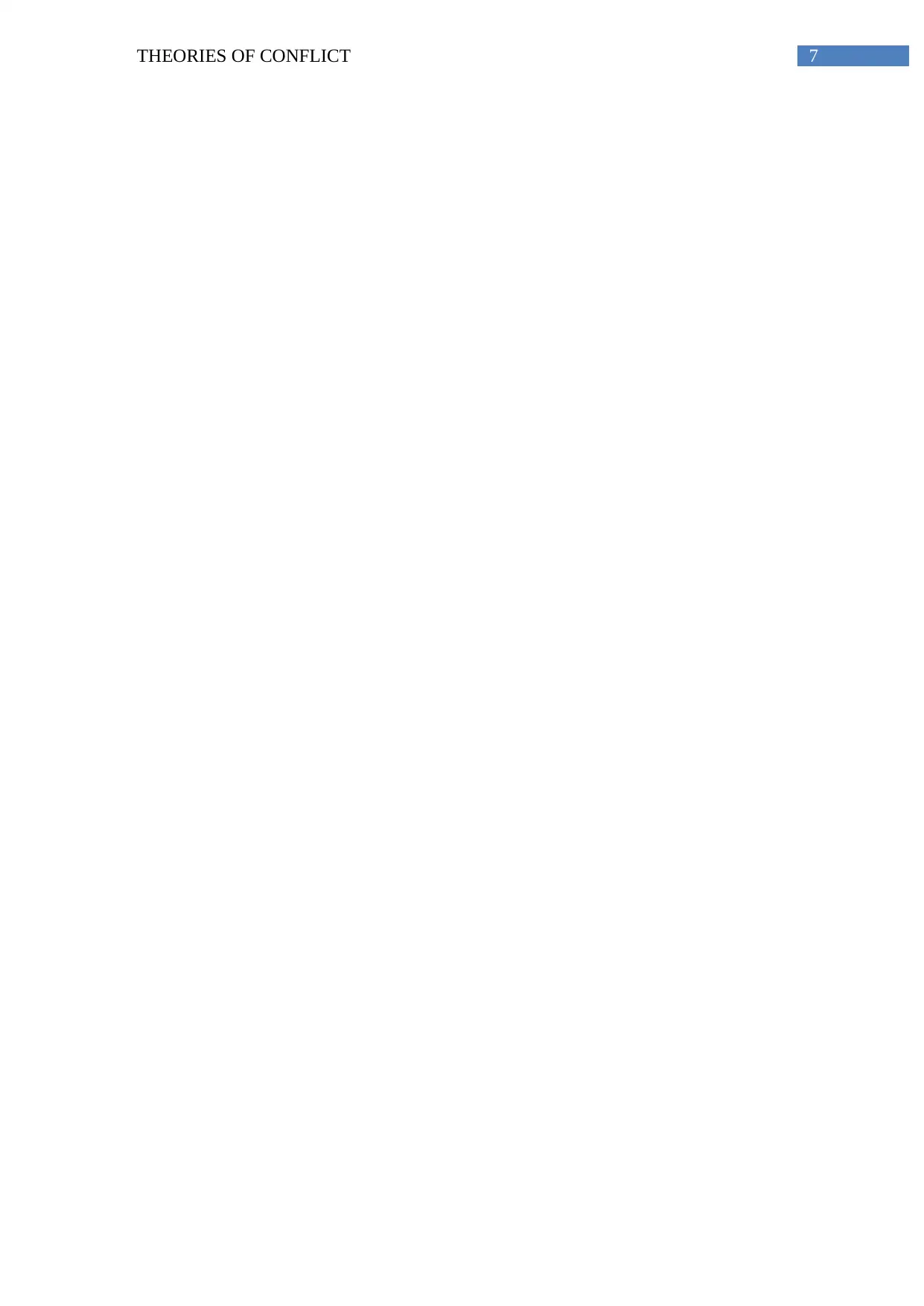
7THEORIES OF CONFLICT
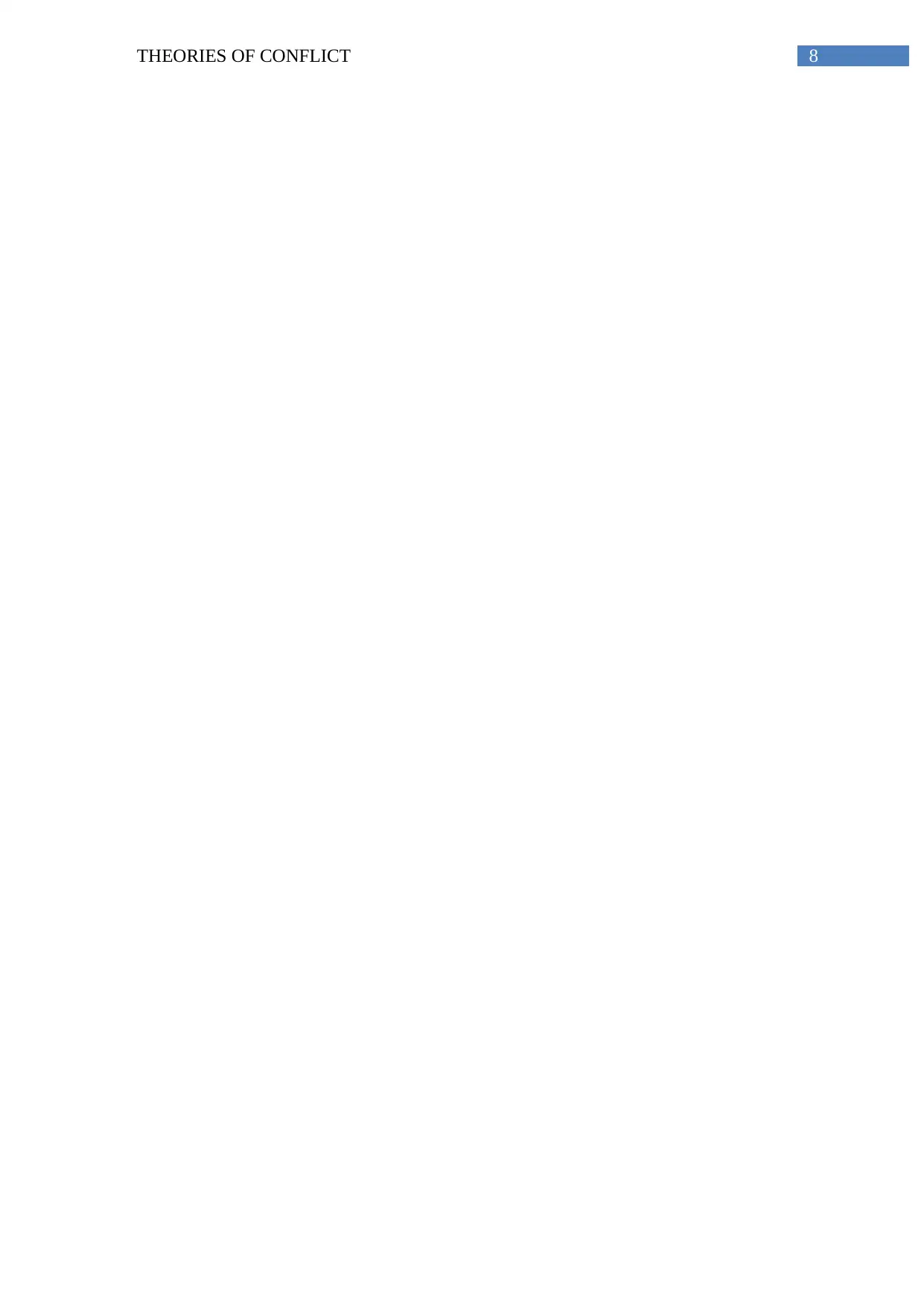
8THEORIES OF CONFLICT
⊘ This is a preview!⊘
Do you want full access?
Subscribe today to unlock all pages.

Trusted by 1+ million students worldwide
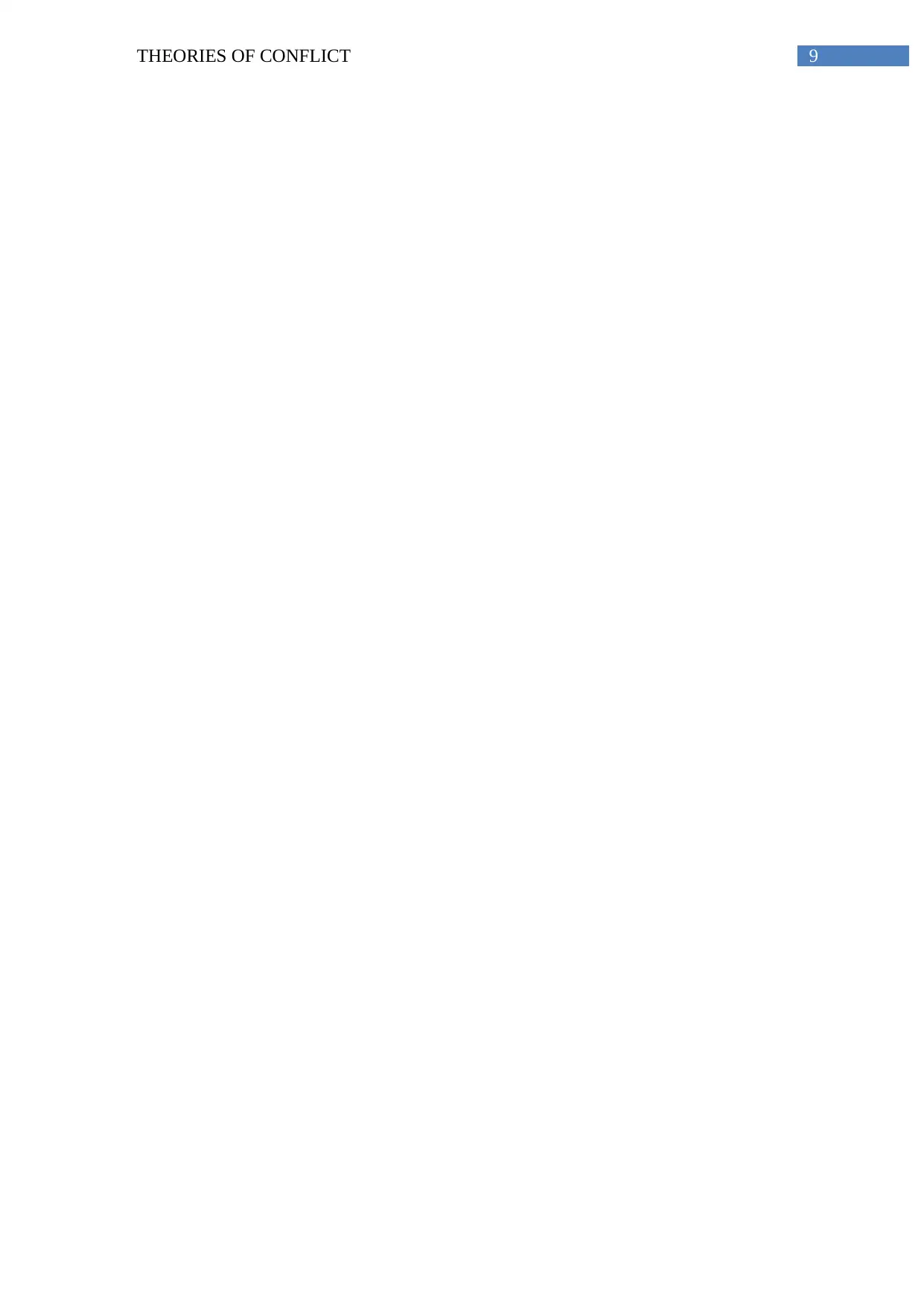
9THEORIES OF CONFLICT
Paraphrase This Document
Need a fresh take? Get an instant paraphrase of this document with our AI Paraphraser
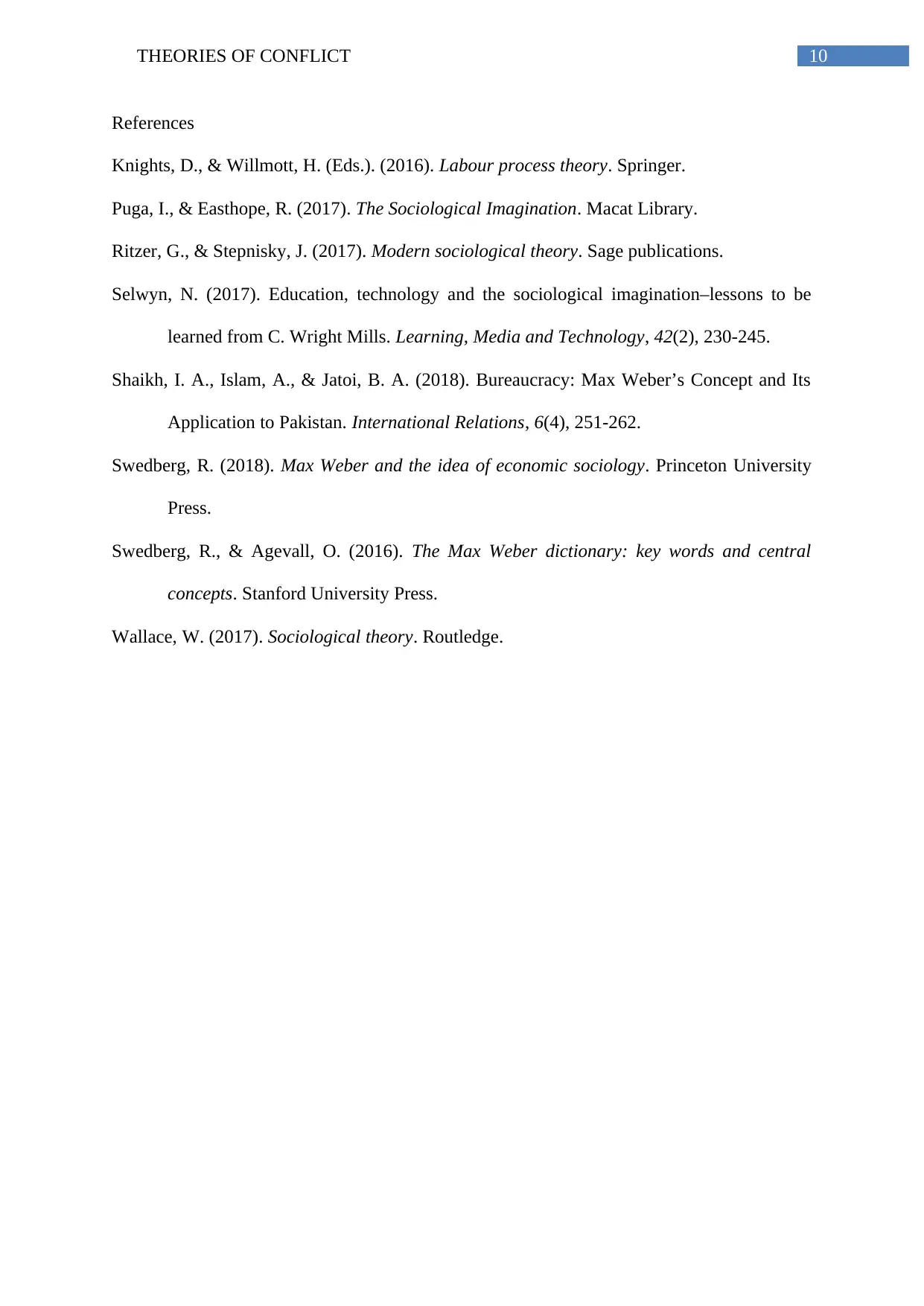
10THEORIES OF CONFLICT
References
Knights, D., & Willmott, H. (Eds.). (2016). Labour process theory. Springer.
Puga, I., & Easthope, R. (2017). The Sociological Imagination. Macat Library.
Ritzer, G., & Stepnisky, J. (2017). Modern sociological theory. Sage publications.
Selwyn, N. (2017). Education, technology and the sociological imagination–lessons to be
learned from C. Wright Mills. Learning, Media and Technology, 42(2), 230-245.
Shaikh, I. A., Islam, A., & Jatoi, B. A. (2018). Bureaucracy: Max Weber’s Concept and Its
Application to Pakistan. International Relations, 6(4), 251-262.
Swedberg, R. (2018). Max Weber and the idea of economic sociology. Princeton University
Press.
Swedberg, R., & Agevall, O. (2016). The Max Weber dictionary: key words and central
concepts. Stanford University Press.
Wallace, W. (2017). Sociological theory. Routledge.
References
Knights, D., & Willmott, H. (Eds.). (2016). Labour process theory. Springer.
Puga, I., & Easthope, R. (2017). The Sociological Imagination. Macat Library.
Ritzer, G., & Stepnisky, J. (2017). Modern sociological theory. Sage publications.
Selwyn, N. (2017). Education, technology and the sociological imagination–lessons to be
learned from C. Wright Mills. Learning, Media and Technology, 42(2), 230-245.
Shaikh, I. A., Islam, A., & Jatoi, B. A. (2018). Bureaucracy: Max Weber’s Concept and Its
Application to Pakistan. International Relations, 6(4), 251-262.
Swedberg, R. (2018). Max Weber and the idea of economic sociology. Princeton University
Press.
Swedberg, R., & Agevall, O. (2016). The Max Weber dictionary: key words and central
concepts. Stanford University Press.
Wallace, W. (2017). Sociological theory. Routledge.
1 out of 11
Your All-in-One AI-Powered Toolkit for Academic Success.
+13062052269
info@desklib.com
Available 24*7 on WhatsApp / Email
![[object Object]](/_next/static/media/star-bottom.7253800d.svg)
Unlock your academic potential
Copyright © 2020–2026 A2Z Services. All Rights Reserved. Developed and managed by ZUCOL.